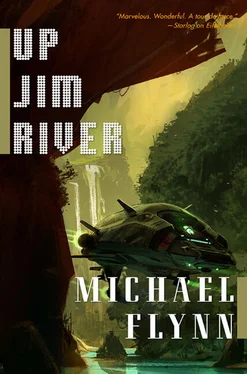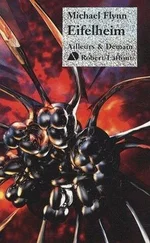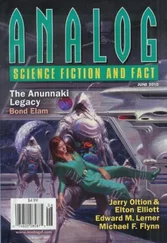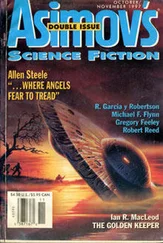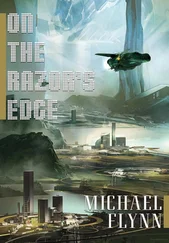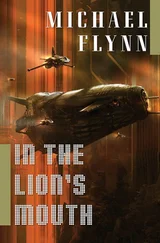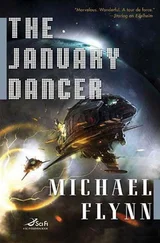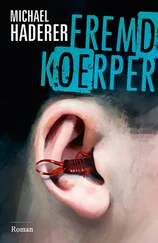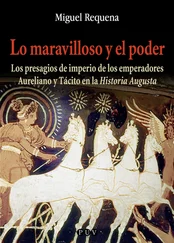She had overseen the restoration of sanitation, of water and utilities, of housing and roads, of public order, and did this primarily by providing in her own person an authority figure to whom the surviving Commissioners could give their devotion. The entire society was based on the Family writ large. The Eastern Marshes praefect had, in effect, gone looking for a mommy or daddy to kiss the hurt—and had been soundly spanked.
The late Emperor had clearly lost “the approval of the sky.” What more proof was needed beyond the descent of his replacement from that very sky? (Thistles knew that Bridget ban had arrived by ship in the normal fashion, but they read meaning into every concatenation.) A change of dynasty was called for, and Bridget ban chose Jimmy Barcelona, who had been Chief of Capital District Public Works Unit. At her suggestion, he selected the office name of Resilient Services and for his regnal theme, “a robust and reliable infrastructure.” It rang less glamorously than most regnal themes, but was surely apropos, all things considered.
The surviving Minister held a different opinion, but when he and three of the imperial censors opened debate by opening fire, he discovered that where a Hound was concerned the decorative could also be deadly. The vote was four to one against Jimmy, but Bridget ban had the one vote, and so he was installed and the others cremated.
No one could do business in Jenlùshy without the emperor’s permission. Certainly, no one could go about making a nosy nuisance of himself without what the Terrans called a “heads-up.” Normally, obtaining an audience with a Thistlewaite emperor was a long, laborious, and expensive affair. The recovery from the ‘quake was still in its final stages, and Resilient Services had better things to do than put on a show for Peripheral touristas. Donovan had counted on this as yet another delay to the harper’s journey, although he had by then given up on dissuading her entirely.
But if the visitor was the daughter of the very Hound who had placed the emperor on the Ivy Throne, doors swung open with disconcerting ease.
The Grand Secretary did insist that protocol be observed. A certain formality of dress was required, although the sumptuary details differed for folk from different worlds. Happily, the harper had brought with her several bolts of Megranomic anycloth, so the morning of the audience, she consulted Benet’s Sumptuary Guide to the Spiral Arm and programmed the material to assume the chosen color, cut, and texture.
The Fudir watched. “Technically,” he said, “we don’t need the One Man’s permission to enter the Corner.” There was a Terran Corner in most major cities across the Spiral Arm. Having been deprived of their home world, Terrans had found no home anywhere, and so could be found everywhere.
Méarana looked up from her ‘face. “We.’ Do you mean us, Terrans in general, or the mob inside your head?” Donovan’s use of the first-person plural was idiosyncratic.
“Oh, Terrans, memsahb.” The Fudir dropped into the patois that he sometimes affected. “Thistle see no many-folk-one-folk, but for Terries.”
She rolled her eyes. “Speak Gaelactic, Fudir. I can’t follow the jibber-jabber half the time.”
“You aren’t meant to, half the time. Corporate bodies, I mean. There are none here. No universities, no cities, no guilds, no medical societies.”
The harper inserted the datathread into the port and ran the program. The cloth began to ripple. “Dinna be silly. They have universities and doctors; and if this be nae a city we’re in, what is it?”
“A department of the imperial court. It takes more than a lot of people living close together to make a ‘city.’ Jenlùshy Town doesn’t govern itself. It isn’t recognized at law as an entity. The same goes for Imperial College: it’s a Department of the Grand Secretariat under the Third Minister. And doctors are employees of the Second Minister. It’s the Minister who sets rules and regulations, not a ‘medical society.’ The Terran Corners are the only places on the planet recognized as self-governing corporate bodies.”
“You sound proud of that.” She detached her clothing from the’ face and made way for the Fudir to sit down. “You want me to do your clothing for this afternoon?”
“You don’t think I can achieve ‘the appropriate level of formality’? Of course, I’m proud of it. It means that when I go to the Palace as a Terran , I have certain rights and liberties. So does a citizen-rancher from Dangchao.”
“I don’t get it, then. If we’re legally outside the imperial system, why the fancy getups for—what did they call the audience? High Tea?”
The Fudir grunted. “There’s law and there’s custom, and custom is the stronger. They may lack legal recourse if we dress uncouthly—but that doesn’t mean they have no recourse at all.”
The harper wore a leine of pure white linen with fitted sleeves, and intricate red geometric embroidery at the neck, cuffs, and hem. It was pulled up and Housed though a leather crios at the waist, in the pouches of which were placed the tools of the harper’s trade. Over this she had thrown a woolen brat in bright green with gold borders. She wore it like a shawl fastened at the right shoulder by a large golden brooch showing a snake entwining a rose. She walked unshod and the nails of her feet and hands matched the color of the embroidery of her leine . Her red hair fell free, to indicate her unwed status, but she wore a silver ollamh’s circlet at her brow.
The scarred man wore Terran garb, and if fewer eyes caressed him than caressed the harper, it was because he was a moon to her sun. He dressed in a dark yellow sherwani over embroidered jutti and matching kurta paijamas . His sandals were plain and of brown leather with golden crescents on the straps. The scars on his head were decently covered by a skullcap, and across his shoulder he had thrown a gharchola stole. Gold lac-bangles adorned his wrists and ankles, and rouge had reddened his cheeks. When he wanted to, the Fudir could cut a figure.
In the anteroom to the audience chamber, the Fudir bowed to the Grand Secretary, and said, in a croak resembling Thistletalk, “This miserable worm prays that these poor rags do not find disfavor in the eyes of noble Grand Secretary.”
That worthy went by the name of Morgan Cheng-li and was known therefore among the backroom staff as “Jingly” in a play on both his name and the sound of the coins that so often crossed his palm. He had that air of self-importance often found among underlings. His frog-like mien—pigeon-chested, eyes bulged, cheeks blown out—gave the impression that he had been holding his breath for a very long time.
The Fudir had learned from the Terrans in palace maintenance that Jingly fancied himself a calligrapher, and so he produced a Gladiola Bill of significant denomination. “Perhaps,” he said, ducking his head by an appropriate amount, “most-accomplished-one might give this humble servant educated opinion on engraving of this wretched bill?”
The Grand Secretary made a motion with his hands, and an underling’s underling scurried over, took the bill between her fingertips, and held it before Jingly’s eyes. “Barbarian work,” the latter said after a moment, using the local term for off-worlders. He placed a loupe in his right eye. “Not without merit, but lacking…” A wave of the hand. “…panache. Perhaps,” he added distastefully, “designed on computer.”
“Your eminence is wise.”
“Pfaugh. Child see such flaws. Observe portrait visage. Where serenity? Where balance?”
“Perhaps expert hand may attempt improvement. Perhaps, use this bill as model.”
Читать дальше
